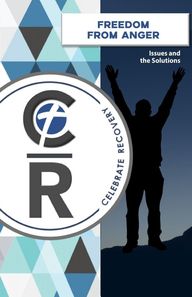
Return to flip book view
Exploring the issue of Anger There is a plan and a purpose for anger in our lives. Anger is one of our 10 basic God-given emotions and there are constructive ways to deal with and express anger. For many of us, anger is the primary way we choose to express emotions. Therefore, anger is an issue that must be managed. We must learn to recognize our unhealthy patterns of anger and the emotions and circumstances that push us to become destructively angry. For us, anger is a “misdirection,” a hang-up that we have developed to mask hurt or fear. At its core, our anger is an intent to preserve our personal worth, essential needs, or basic convictions. We may feel intense shame and guilt over the actions we have committed during our unhealthy expressions of anger. We vow never to act that way again, only to find ourselves back in the same situations, unable to change it by our own power. Characteristics of someone struggling with Anger may include, but are not limited to: • I have to raise my voice to get my point across. • I become impatient easily when things do not go according to my plans. • When I am displeased with someone, I may shut down any communication with them or withdraw entirely. • I am annoyed easily when others don’t appear sensitive to my needs or convictions. • I do not easily forget when someone “does me wrong” • When someone confronts me with a misinformed opinion, I am thinking of my comeback while they are speaking. • When I am forced to deal with emotions or circumstances that I do not want, I become resentful. • I become annoyed when others don’t hold themselves to the same standards that I hold myself to. • I often use sarcasm and humor to communicate a point. • People take me seriously when I am “aggressive.” • I may act kindly toward others on the outside yet feel bitter and frustrated on the inside. • I find myself overreacting to minor incidents. FREEDOM FROM ANGER
How We Find Recovery Through a relationship with Jesus Christ as Savior and Higher Power, and by working through the 8 principles and the Christ-centered 12 steps, we can find freedom from our hurts, hang ups and habits. Characteristics of someone in recovery for Anger Issues may include, but are not limited to: • We have accepted Jesus Christ as our Higher Power. • Working the 12step recovery process diligently and consistently. • We are learning that Jesus can be trusted. • We are shifting our focus from ourselves and our desires to serve God and others. • We are learning to take more personal responsibility for our actions and emotions. • We are learning to “take a pause” before reacting. • We have learned to recognize unhealthy patterns of anger in our lives. • We have shared those patterns and “triggers” with at least one other person and are accountable to them for how we deal with them. • We are learning to deal with our anger quickly. • Ephesians 4:26, “In your anger do not sin; do not let the sun go down on your anger.” • We are becoming more comfortable expressing our more vulnerable emotions like fear, hurt, rejection, and insecurity. FREEDOM FROM ANGER, cont.